Collected Fragments of ALCAEUS (c. 625/620-c. 580 BC)  Contents
Contents  Delphi Classics 2022 Version 1
Delphi Classics 2022 Version 1  Browse Ancient Classics
Browse Ancient Classics 





 Collected Fragments of ALCAEUS OF MYTILENE
Collected Fragments of ALCAEUS OF MYTILENE  By Delphi Classics, 2022
By Delphi Classics, 2022
COPYRIGHT
Collected Fragments of Alcaeus First published in the United Kingdom in 2022 by Delphi Classics. Delphi Classics, 2022. All rights reserved. No part of this publication may be reproduced, stored in a retrieval system, or transmitted, in any form or by any means, without the prior permission in writing of the publisher, nor be otherwise circulated in any form other than that in which it is published.
ISBN: 978 1 80170 051 1 Delphi Classics is an imprint of Delphi Publishing Ltd Hastings, East Sussex United Kingdom Contact: sales@delphiclassics.com  www.delphiclassics.com
www.delphiclassics.com
The Translation

Mytilene, the capital of the Greek island of Lesbos Alcaeus birthplace

Ancient ruins at Mytilene
The Fragments

Translated by J. M. Edmonds, Loeb Classical Library, 1922 Alcaeus of Mytilene (c.625/620 c.580 BC) was a lyric poet from the Greek island of Lesbos, who is credited with inventing the Alcaic stanza (which consists of two Alcaic hendecasyllables, followed by an Alcaic enneasyllable and an Alcaic decasyllable). A contemporary of Sappho, also from Lesbos, he was included in the canonical list of nine lyric poets by the scholars of Hellenistic Alexandria. He was born into the aristocratic governing class of Mytilene, where he was involved in political disputes and feuds. By the end of the seventh century BC, Mytilene was the most influential of all the North Aegean Greek cities, with a strong navy and colonies securing its trade-routes in the Hellespont.
The city had long been ruled by kings born to the Penthilid clan, but during Alcaeuss life, the Penthilids were a depleted force and rival aristocrats and their factions contended for supreme power. Alcaeus and his older brothers were passionately involved in the struggle, though they experienced little success. At some point prior to 600, Mytilene fought Athens for control of Sigeion and Alcaeus is believed to have taken part in the fighting. According to Herodotus, he threw away his shield to make good his escape from the victorious Athenians and then celebrated the occasion in a poem that he sent to his friend, Melanippus. It is thought that Alcaeus travelled widely during his years in exile, including at least one visit to Egypt. He wrote numerous verses in celebration of Antimenides return, including a reference to his valour in slaying the larger opponent and he proudly describes the military hardware that adorned his family home.
Since both Alcaeus and Sappho composed for the entertainment of Mytilenean friends, they would have had opportunities to associate with each other, including at such events as the Kallisteia, an annual festival celebrating the islands federation under Mytilene, held at the Messon, where Sappho is known to have performed with female choirs. Alcaeus refers to Sappho in his poetry in terms more typical of a divinity, as holy/pure, honey-smiling Sappho, which may have been inspired by the witnessing of her performances. The works of Sappho and Alcaeus represent for many the high point of brilliance for the development of early Greek lyrical poetry. Alcaeus poems were collected into ten books, with elaborate commentaries, by the Alexandrian scholars Aristophanes of Byzantium and Aristarchus of Samothrace sometime in the 3rd century BC. Sadly, today his verses exist only in fragmentary form, varying in size from mere phrases to entire groups of stanzas. Some ancient critics held Alcaeus even higher than Pindar in their estimation of his poetical abilities.
Dionysius of Halicarnassus wrote: Observe in Alcaeus the sublimity, brevity and sweetness coupled with stern power, his splendid figures, and his clearness which was unimpaired by the dialect; and above all mark his manner of expressing his sentiments on public affairs, while Quintilian, after commending Alcaeus for his excellence in that part of his works where he inveighs against tyrants and contributes to good morals; in his language he is concise, exalted, careful and often like an orator; goes on to add: but he descended into wantonness and amours, though better fitted for higher things. The poems are conventionally grouped according to five genres.
Next page
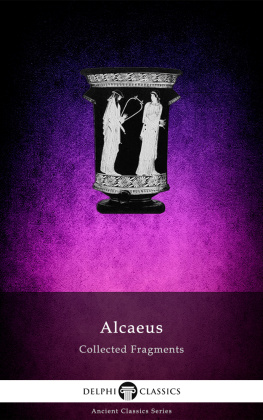
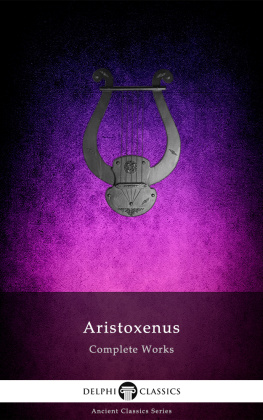
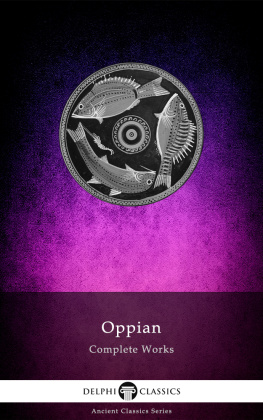
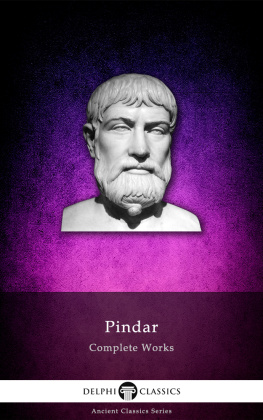
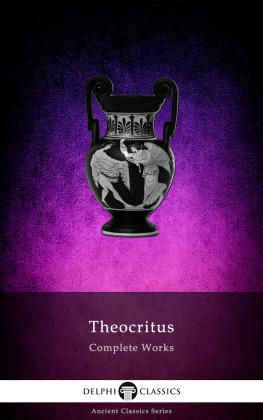
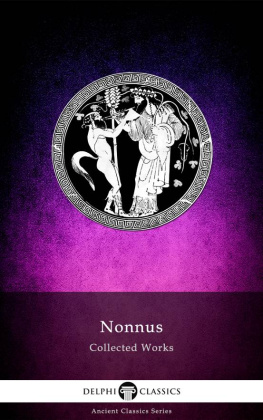
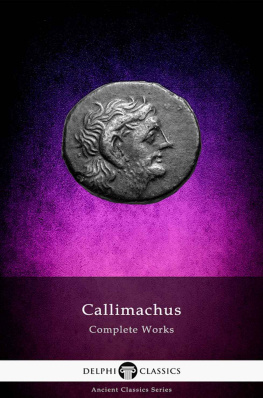
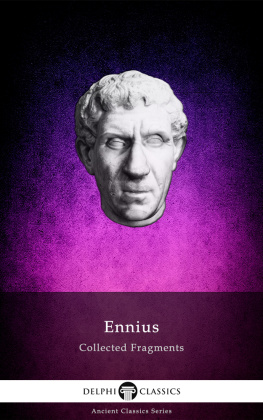
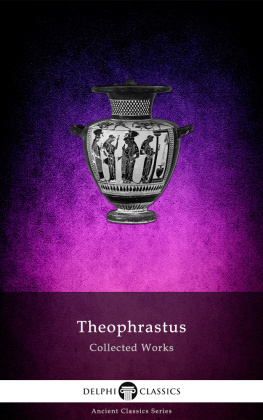

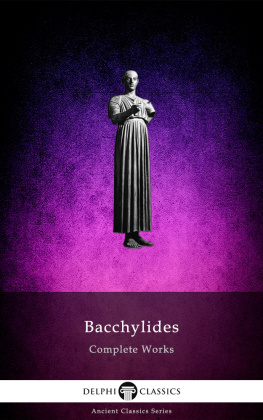

 Contents
Contents  Delphi Classics 2022 Version 1
Delphi Classics 2022 Version 1  Browse Ancient Classics
Browse Ancient Classics 





 Collected Fragments of ALCAEUS OF MYTILENE
Collected Fragments of ALCAEUS OF MYTILENE  By Delphi Classics, 2022
By Delphi Classics, 2022 www.delphiclassics.com
www.delphiclassics.com Mytilene, the capital of the Greek island of Lesbos Alcaeus birthplace
Mytilene, the capital of the Greek island of Lesbos Alcaeus birthplace  Ancient ruins at Mytilene
Ancient ruins at Mytilene  Translated by J. M. Edmonds, Loeb Classical Library, 1922 Alcaeus of Mytilene (c.625/620 c.580 BC) was a lyric poet from the Greek island of Lesbos, who is credited with inventing the Alcaic stanza (which consists of two Alcaic hendecasyllables, followed by an Alcaic enneasyllable and an Alcaic decasyllable). A contemporary of Sappho, also from Lesbos, he was included in the canonical list of nine lyric poets by the scholars of Hellenistic Alexandria. He was born into the aristocratic governing class of Mytilene, where he was involved in political disputes and feuds. By the end of the seventh century BC, Mytilene was the most influential of all the North Aegean Greek cities, with a strong navy and colonies securing its trade-routes in the Hellespont.
Translated by J. M. Edmonds, Loeb Classical Library, 1922 Alcaeus of Mytilene (c.625/620 c.580 BC) was a lyric poet from the Greek island of Lesbos, who is credited with inventing the Alcaic stanza (which consists of two Alcaic hendecasyllables, followed by an Alcaic enneasyllable and an Alcaic decasyllable). A contemporary of Sappho, also from Lesbos, he was included in the canonical list of nine lyric poets by the scholars of Hellenistic Alexandria. He was born into the aristocratic governing class of Mytilene, where he was involved in political disputes and feuds. By the end of the seventh century BC, Mytilene was the most influential of all the North Aegean Greek cities, with a strong navy and colonies securing its trade-routes in the Hellespont.